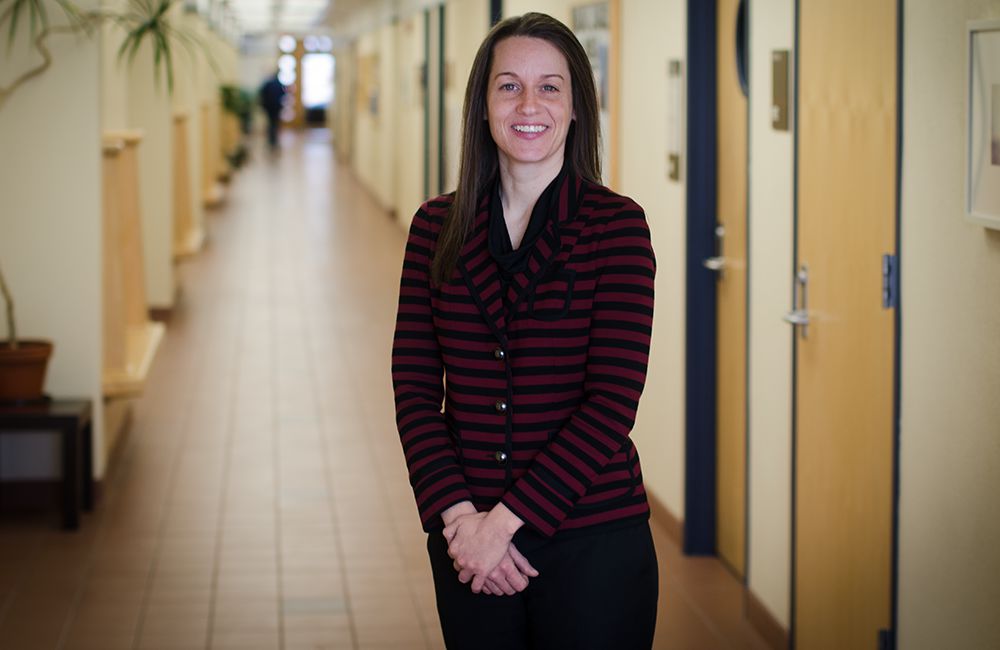As the five-story, 330,000-square-foot Health Clinics and Surgery Center takes shape on the east bank of the Twin Cities campus, associate professor Lynette Renner works at her desk in St. Paul preparing a study involving more than 50 clinics merging into the new University health facility.
Renner, along with two co-investigators from the University’s Department of Medicine, are conducting a study aimed at modifying and improving the way medical professionals screen adults for signs of intimate partner violence and relationship abuse.
The study—funded by a grant from the Office on Women’s Health at the U.S. Department of Health and Human Services—includes training University healthcare professionals how to screen patients using evidence-based tools. The training guides them through the steps to take if a person discloses that they’ve experienced intimate partner violence. Renner believes that if the clinics’ employees feel more confident in the screening and referral process, victims of partner violence will be more likely to receive the care they need.
“That’s often a barrier for why professionals are hesitant to screen,” explains Renner. “It’s not because they don’t think it’s important. It is because they have not been sufficiently trained and are unsure of their role in the process.”
“We are working to help healthcare professionals receive better quality training and better understand how—by screening individuals and by referring them for appropriate services—they can have a significant impact on improving a client’s physical and mental health.”
Renner, who is in her third year on the faculty in the School of Social Work, has been researching intimate partner violence since before she came to the University in 2013. In addition to her work with the Department of Medicine, she recently wrapped up a five-year project with Iowa Legal Aid and is completing a study in partnership with Domestic Abuse Project, a Minneapolis-based agency that provides therapy and advocacy services.
Most of Renner’s research studies revolve around the subject of family violence, and many focus on medical, therapeutic, or legal service interventions for victims and their families.
Role models at home
Growing up with a father who was a social worker and professor and a mother who was a physician’s assistant, Renner says she and her sisters learned from their parents how important it is to provide service and assist others.
Renner saw some of the challenges that careers in the helping professions can pose, but it didn’t dissuade her from studying social work.
“I considered several professions, but my passions and values won in the end,” she says. “I wanted to be a social worker.”
The power of partnerships
Arriving in the Twin Cities, Renner was pleasantly surprised at the wealth of community partnership opportunities.
“Within the school, within the University, within the community, the recognition and embrace of the research–practice partnership is just incredible,” says Renner.
In her classroom, students learn how partnership and working together is an important part of any kind of social work practice. Teaching courses on group and family work, Renner views each of her classes as a group where collaboration is an essential key to success.
“I try to keep my courses interactive because we all learn from each other,” she says. “I want to be well prepared, and I also want students to bring in their knowledge and experiences and apply these to what we are learning together.”
Diversity and potential
Many of Renner’s master’s and Ph.D. students didn’t study social work as undergraduates. They bring diverse backgrounds and different kinds of knowledge that contribute to a unique classroom dynamic.
“I really like challenging students and having them challenge me,” Renner says. “It’s one of the more enjoyable aspects of teaching—having a certain level of content knowledge and then putting it out there and seeing how it resonates with everyone else in the room.”
Many different kinds of students are drawn to social work because of its diverse nature. But not everyone is aware of the breadth of the field and the capabilities of social work professionals, says Renner. It can be a challenge working with people or organizations with a limited idea of what social workers actually do. Through her career, Renner herself has seen the ways that social work expands and overlaps with different parts of people’s lives.
“I’ve always known the field was diverse, but the more I learn, the more I recognize how diverse it truly is and how much of an impact social workers have on many facets of people’s well-being all across the lifespan,” she says.
The partnerships available in the School of Social Work, the college, and the University community make CEHD an excellent fit for students looking to explore such a diverse field.
“This is a place to bring your passions and your motivation to learn.”
“Be prepared to be encouraged, guided, and challenged, and come with an open mind and a desire to work hard,” says Renner. “Really, there are no limits to learning, and for people who have that mindset, this is a fantastic place to be.”
Renner sees it as her responsibility to ready her students for the many places they can take their degrees and experience.
“Any time you look out into a classroom, there’s just tremendous potential,” she says. “You know that with hard work, students can become amazing social workers, educators, and researchers.”
Learn more about Lynette Renner and the School of Social Work.
Story by Ellen Fee | Photo by Susan Andre | February 2016
